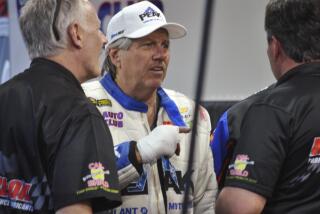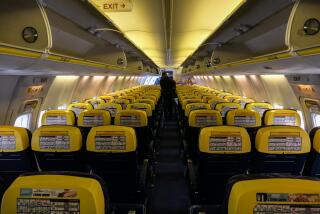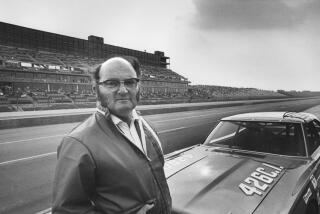Wheels of Fortune : Paralyzed Racer Uses ‘Twisted-Grip Theory’ to Attack His New Hobby at Full Throttle
- Share via
Marty Vogel felt as if he had been there before. And in a sense, he had.
His body limp on a hospital bed, Vogel’s mind wandered back to 1983 when he learned that his friend, Stewart Goddard, had been left paralyzed by a motorcycle accident.
Only this time Vogel was paralyzed. That day, April 20, 1986, on a practice run at Sears Point Raceway in Sonoma, Vogel’s professional motorcycle racing career came to a tragic end when he hit a wall trying to avoid another rider. His back was broken in two places.
But his racing career survived.
On Sunday Vogel will race a wheelchair in the third annual Los Angeles Marathon. It will be his fifth marathon and probably his finest.
Vogel has trained extensively for the race, bringing his physical skills up to par with a positive mental outlook. Vogel has avoided many of the attitudinal peaks and valleys, due in large part to Goddard.
Goddard had difficulty adjusting after his accident, his recovery slowed by an overabundance of support from family and friends, Vogel said. When Vogel found himself in the same position three years later, he decided to start his rehabilitation at the Santa Clara Valley Medical Center in Sonoma, where he had remained since shortly after the accident.
“One thing I had to my advantage was that I knew what could happen if I started feeling sorry for myself,” Vogel said. “I didn’t want to have my family and friends coming in and saying ‘It’s OK, Marty,’ because it wasn’t and I had to learn that. The only way I thought I would learn it was to be by myself, where I didn’t have to worry about how they thought I looked or felt.”
Spurred on by a desire for knowledge, Vogel progressed even beyond his own expectations. He wanted to try everything.
And when doctors tried to explain his limitations, Vogel’s usual response was to ask why they felt it couldn’t be done.
After years of competitive racing, Vogel needed a new vehicle to vent his frustration, energy and most of all his competitiveness.
He found that outlet one afternoon on a hospital wall. There was a poster of Rick Hansen, the first person to travel around the world in a wheelchair. Hansen’s accomplishment made Vogel realize that his new way of life could be either limited or limitless.
Vogel opted for the latter.
Jim Knaub remembers the day he met Vogel. Knaub, a wheelchair racer who has twice won the Boston Marathon, had just broken the ribbon at the finish line of the Ventura Boulevard Half Marathon in the San Fernando Valley. Wheeling toward him was a young man who Knaub characterizes as “very genuine and very intense.”
Vogel had tried to follow Knaub’s progress throughout the race but lost sight of him after the start. He drove down the Ventura Freeway parallel to the course but did not catch up to Knaub until after he had finished.
Impressed by Knaub’s speed and durability, Vogel approached the racer and introduced himself. Knaub offered to let Vogel borrow a racing chair, and several weeks later Vogel made the trek to Knaub’s Long Beach home. Knaub taught him how to use the specialized wheelchair and let him borrow some gloves. The next day Vogel entered his first race.
Vogel’s time in the 10-kilometer event was less than impressive. But his accomplishment was.
“He’s like a dog with an ear that’s been bit off and its tail is broken but he keeps going,” Knaub said. “He has a unique perspective on life.”
Knaub, a former pole vaulter, said that he and Vogel share the “twisted-grip theory” of living. On a motorcycle, how far the grip is turned or “twisted” determines the speed of the bike. Twist it wide open, and you’re running at full speed.
“A lot of people in chairs, they just exist,” Knaub said. “Some people do drugs or alcohol. Some people throw themselves into school. But for us it’s not a matter of throwing ourselves into something. We have to be able to train and compete and perform at a certain level.
“Racing is allowing him to twist the grip.”
Vogel has steadily improved since his first race, finishing 28th in last years’ Los Angeles Marathon (2:40), 18th in the Boston Marathon (2:38) and third in the Holiday Bowl Marathon in San Diego (2:12). He often enters 10-kilometer and half-marathon races, even when there is no wheelchair division. And often, he wins. Some able-bodied runners resent his top finishes, particularly when prize money is at stake. But like Hansen’s world tour, Vogel’s aim is education.
“People gripe because I finish first and I screw up everybody’s time,” Vogel said. “I don’t stick around for my trophies or the money awards. I just do it to make them think about what they’re doing. If they are going to have runners, they should have a wheelchair class.”
Two years ago, Vogel was too busy to give the subject much consideration. The La Canada High graduate began racing his 600cc motorcycle in the amateur ranks his senior year, winning several races in the modified super street division and several more the next season. By the time Vogel turned professional in 1984, he was convinced that his future was in racing. He traveled all but three months of the year, earning $30,000 in his first season and $47,000 in 1985.
“I’m not really a studious person,” Vogel said. “Racing said it all for me.”
After the accident, Vogel disassociated himself from the sport to which he had devoted much of his life.
Only recently has he regained his interest, partly because he has started a new racing career.
“It’s complete freedom,” Vogel said. “It’s just like racing. Actually, it’s a little tougher.”
More to Read
Go beyond the scoreboard
Get the latest on L.A.'s teams in the daily Sports Report newsletter.
You may occasionally receive promotional content from the Los Angeles Times.










